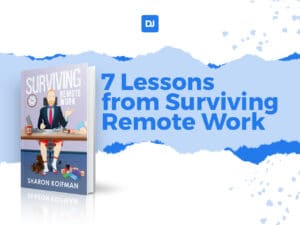
Are you one of those “BUT” people? You know, the ones that thing “Gee, I would love to have access to the best talent all around the world, and at great prices no less, BUT it’s really complicated to work with people remotely.”
Let me stop you right there, friend. Remote work is so feasible and frictionless that a couple of employees with the right attitude can come (virtually!) together from across a continent and deliver an incredible, million-selling product. Let me tell you the story of RocketCat Games…
RocketCat Games was founded in the most unlikely of places – a chat channel for the old online game Asheron’s Call. It was there that Kepa Auwae, the lead designer at RocketCat ( a great company name, by the way – we are considering founding DistantCat to help people find remote funny pets – but moving on) met the two other enterprising young men that would become RocketCat’s programmer and artist.
From a simple conversation about the kinds of games they wanted to make, and how they would go about doing it, they started creating a design document, and soon they were working on their first game from opposite edges of the US. It was enough of a hit on the iPhone that the team could devote a larger amount of their time to the second title – which became a million-seller and allowed them to quit their day jobs and found their company. A 100% remote company.
Their games have consistently sold millions ever since. They deliver them (mostly!) on schedule, and have built a reputation of programming solid, stable software which they constantly update and add value to.
So how did they manage their remote work?
When interviewing top cat Kepa, I prodded him to share a bit of the process and tools that they had used to reach such outstanding productivity and the associated results. His answer:
“We coordinate using a shared design document, then a checklist where we track what we have to do next. Everyone has a lot of autonomy to do what they think is right for the project. So everyone has a hand in it, and it’s easy to do with our [self-developed, game design] tools.”
Surely there’s more to it than, Kepa. Right? I prodded further; I wanted specifics, tools, and techniques that DistantJob could share with our clients and readers.
As is it happens, there weren’t any.
The value of keeping remote work simple
Kepa admitted to me that they didn’t even use a project management system like Trello or a sophisticated chat system like Slack. They were constantly on Skype, but that was actually mostly for outbound purposes – in effect they still chatted with each other via – you guessed it – the chat channel for that nearly-defunct, 11-year old online game.
“It just works.”
They use Google Docs for sharing a design doc to make sure no-one steps on each other’s toes, and keep a shared checklist to keep track of project milestones and to-dos. That’s all they use for their multimillion-selling game business. Talk about a low overhead!
Great remote work – just like non-remote work – is about engagement and motivation
I know what you’re thinking. “This would never fly in our company! They’re just three guys. We are [insert team size here]!”
I’m not saying that you need to give up Slack, or Trello, or some other of the awesome tools that enable high-quality remote work. In fact, we at DistantJob recommend them all the time.
The point of the story is that the tools are a facilitator for a great team; they don’t make a great team. What makes people like Kepa and co. be able to come together over large distances isn’t the tools they use – those are as barebones as they come.
Instead, what makes them an excellent team is the lack of friction provided by a simple system (check shared doc – pick a task from the checklist – GO!) and the commitment to a project that is in tune with their values, and to each other. This is culture, of course – when we want to get the most out of anybody in a company, it usually comes back to company culture.
Conclusion and action steps
The tools are great. They are the oil that turns a functioning machine into a well-oiled machine. They don’t make a broken machine, or one missing some pieces, magically work. So, before you focus on finding the right tools for your team, consider the team itself.
Is everyone engaged and motivated in their work? Is there a point of friction – something that is too complicated or too unpleasant – that makes people unhappy with the work? What can you do to remove it? Who can you assign that would be delighted in solving it?
These are key questions that can help any team get unstuck – remote or not. Ask them before you go shopping for new tools – that is often just a way of trying to run away from the real issues.



